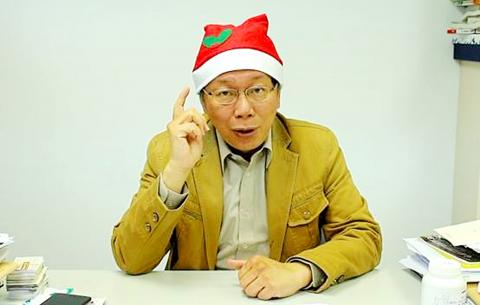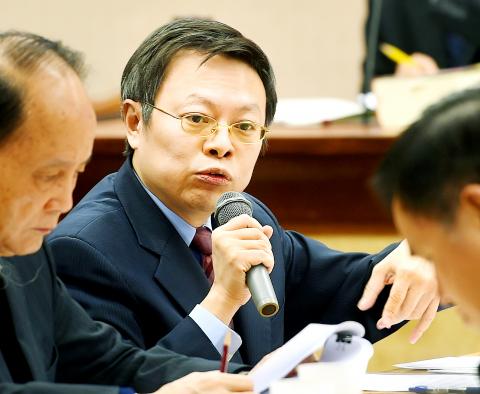Mainland Affairs Council (MAC) Minister Wang Yu-chi (王郁琦) yesterday lashed out at Taipei mayor-elect Ko Wen-je (柯文哲) for saying that the “1992 consensus” is outdated and that new ideas are needed to conduct cross-strait exchanges.
Ko made the remarks during an interview published on Tuesday by the Central News Agency in which he proposed replacing the “1992 consensus” with the “four mutuals” — mutual knowledge, mutual understanding, mutual respect and mutual cooperation.
Wang responded that the “1992 consensus” is an essential and practical part of cross-strait exchanges, adding that Ko should learn more about the matter before commenting on it.

Photo: Chen Ping-hung, Taipei Times
“As a mayor[-elect] of a local government, Ko does not have to make remarks on cross-strait exchanges, but if he really wishes to comment on this, he should first take an in-depth look into the backdrop against which the ‘1992 consensus’ was created and at its effect on cross-strait exchanges today,” Wang said.
The “consensus” refers to an alleged tacit agreement reached in 1992 that both Taiwan and China belong to one China, with each side having their own interpretation of what “one China” means.
Although the Chinese Nationalist Party (KMT) government claimed that the consensus was agreed upon during the first cross-strait conference in Singapore in 1992, former MAC minister Su Chi (蘇起), who was involved in the 1992 meeting, later said he made up the term.

Photo: Fang Pin-chao, Taipei Times
Wang yesterday said that the “1992 consensus” is certainly “ambiguous,” but it is that ambiguity which gives Taiwan and China a buffer zone when dealing with politically sensitive issues.
“I would say that it is because of the ‘1992 consensus’ that cross-strait relations have been able to progress so much since President Ma Ying-jeou (馬英九) took office in 2008. We can see how bad things got during the Democratic Progressive Party administration, when the government refused to recognize the ‘consensus,’” Wang said.
Responding to Wang’s remarks, Ko said the “1992 consensus” has been around for 22 years and yet cross-strait relations are still unclear.
“We need some new ideas in dealing with cross-strait relations,” he said.
However, Ko added that, as a mayor, he has no authority to deal with cross-strait issues, but had been “merely making the remarks [in the interview] as a citizen of the nation, so if Wang thinks he is better at that, he can deal with cross-strait exchanges however he wants.”

INVESTIGATION: The case is the latest instance of a DPP figure being implicated in an espionage network accused of allegedly leaking information to Chinese intelligence Democratic Progressive Party (DPP) member Ho Jen-chieh (何仁傑) was detained and held incommunicado yesterday on suspicion of spying for China during his tenure as assistant to then-minister of foreign affairs Joseph Wu (吳釗燮). The Taipei District Prosecutors’ Office said Ho was implicated during its investigation into alleged spying activities by former Presidential Office consultant Wu Shang-yu (吳尚雨). Prosecutors said there is reason to believe Ho breached the National Security Act (國家安全法) by leaking classified Ministry of Foreign Affairs information to Chinese intelligence. Following interrogation, prosecutors petitioned the Taipei District Court to detain Ho, citing concerns over potential collusion or tampering of evidence. The

TRADE: The premier pledged safeguards on ‘Made in Taiwan’ labeling, anti-dumping measures and stricter export controls to strengthen its position in trade talks Products labeled “made in Taiwan” must be genuinely made in Taiwan, Premier Cho Jung-tai (卓榮泰) said yesterday, vowing to enforce strict safeguards against “origin laundering” and initiate anti-dumping investigations to prevent China dumping its products in Taiwan. Cho made the remarks in a discussion session with representatives from industries in Kaohsiung. In response to the US government’s recent announcement of “reciprocal” tariffs on its trading partners, President William Lai (賴清德) and Cho last week began a series of consultations with industry leaders nationwide to gather feedback and address concerns. Taiwanese and US officials held a videoconference on Friday evening to discuss the

NEGOTIATIONS: The US response to the countermeasures and plans Taiwan presented has been positive, including boosting procurement and investment, the president said Taiwan is included in the first group for trade negotiations with the US, President William Lai (賴清德) said yesterday, as he seeks to shield Taiwanese exporters from a 32 percent tariff. In Washington, US Trade Representative Jamieson Greer said in an interview on Fox News on Thursday that he would speak to his Taiwanese and Israeli counterparts yesterday about tariffs after holding a long discussion with the Vietnamese earlier. US President Donald Trump on Wednesday postponed punishing levies on multiple trade partners, including Taiwan, for three months after trillions of US dollars were wiped off global markets. He has maintained a 10 percent

PERSONAL DATA: The implicated KMT members allegedly compiled their petitions by copying names from party lists without the consent of the people concerned Judicial authorities searched six locations yesterday and questioned six people, including one elderly Chinese Nationalist Party (KMT) member and five KMT Youth League associates, about alleged signature forgery and fraud relating to their recall efforts against two Democratic Progressive Party (DPP) legislators. After launching a probe into alleged signature forgery and related fraud in the KMT’s recall effort, prosecutors received a number of complaints, including about one petition that had 1,748 signatures of voters whose family members said they had already passed away, and also voters who said they did not approve the use of their name, Taipei Deputy Chief Prosecutor